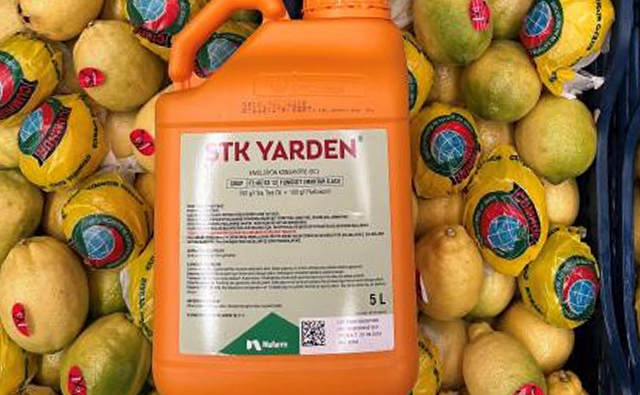Industry News, Fungicides, Agriculture & Feed
STK Yarden™ ‘Hybrid’ Fungicide Launched in Turkey for post-Harvest Protection

Industry News, Fungicides, Agriculture & Feed

Feature image courtesy of agropages.com
STK bio – ag technologies, a pioneer and leader in botanical – based and hybrid solutions for sustainable agriculture and aquaculture, announces the introduction of new STK Yarden® ‘hybrid’ fungicide for Pre & post-harvest crop protection.
STK Yarden™ is now approved in Turkey for citrus as post-harvest protection from rot disease, such as Penicillum spp., in Tomatoes for the controlling of Botrytis Cinerea and damping off (Rhizoctonia solani., Fusarium spp., Phythium spp.) Nufarm is STK Yarden’s distributor in Turkey. Based on successful field testing, label expansion is planned to grapes for Botrytis; cherries for Monilia; peaches and nectarines for Monilia and pre-harvest market; and eggplant and peppers for Fusarium and Botrytis. STK Yarden™ is a botanical-based fungicide, a mixture of Tea Tree Oil (TTO) and Fludioxonil.
Geographic expansion plans for STK Yarden® will begin with Colombia, with the rest of Latin America and global expansions to follow.
According to STK’s Global VP Sales Yair Nativ, ″ STK Yarden™ is STK’s second ‘hybrid’ fungicide. The first is REGEV™. While REGEV™ is ideal for the growing season and is currently used in Turkey and 14 countries, including the US, Latin America and East Asia regions, STK Yarden™ introduces the novel and unique MoA of TTO for post-harvest diseases control, enabling citrus and other crops to stay fresher longer throughout storage, transportation and at the retail food chains … from harvest to fork.″
STK Region Manager , AFME & APAC, Gilad Reznik Cohen stated, ″ We are excited to have Nufarm Turkey as STK Yarden’s exclusive distribution partner in Turkey. The Nufarm team is highly expert and works closely with growers to achieve the desired results.″
Nufarm Turkey’s CEO Murat Borazan added, ″STK Yarden is a great new tool for growers because it protects citrus and other crops during post-harvest, enabling these crops to stay fresher longer with only half the residues of synthetic chemical fungicides. This is increasingly important to growers, retail food chains and customers.″